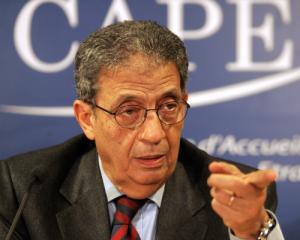Arab states seek counterweight to Iran's hand in Iraq
 Baghdad - When Arab League Secretary General Amr Moussa visited US-controlled Iraq for the first time in 2005, most of the talk was about "not giving up on Iraq as an Arab country."
Baghdad - When Arab League Secretary General Amr Moussa visited US-controlled Iraq for the first time in 2005, most of the talk was about "not giving up on Iraq as an Arab country."
At that time, many Sunni Arab countries, particularly those allied with the United States, feared a disintegrating Iraq - with its majority Shiite population - would fall under the shadow of an interventionist, revolutionary Shiite Iran, and that the Arab world would be powerless to prevent it.
Four years on, with Moussa set to leave Iraq on Wednesday from the Kurdish city of Sulimaniya after a two-day visit, the talk is now decisively about "increasing the Arab role in Iraq."
"There is a big difference between Iraq then and Iraq now, and I can certainly feel the difference," Mussa said following a series of talks with Iraqi officials that started with Iraqi Prime Minister Nuri al-Maliki and included Iraqi Foreign Minister Hoshyar Zebari.
The "big difference" he felt was the vastly improved security situation in the country compared to the sectarian chaos evident in 2005 in the wake of the US-led invasion.
On Wednesday, Moussa said, with a genuine satisfaction, that Iraq "is stepping away from the ethnic and tribal divisions" that had all but wrecked the country a few years ago.
"Today, Iraq is moving towards reconciliation," he continued. "We support and encourage this because it is only through full and genuine national reconciliation that Iraq can... regain its crucial role in the Arab world."
Behind Moussa's words was the knowledge that Iraq is now much closer to Iran, the all-but-declared enemy of several Arab states, than ever before.
As a result, concern over the growing influence of Iran in Iraq has ignited Arab determination to reach out to Baghdad, despite the many security concerns and even traumas that are bound to prohibit the delegation of Arab diplomats to the Iraqi capital.
"We cannot allow Iran to take control of Iraq," a senior Egyptian diplomat told Deutsche Presse-Agentur dpa on condition of anonymity.
Many of the parties in al-Maliki's coalition have overt ties to Iran, a sore point with many Sunni politicians and the Americans.
The association is "open enough that Iranian intelligence acts openly and freely across all of Iraq, even in the hardcore Sunni towns," charged an Iraqi diplomat, speaking to dpa on condition of anonymity.
Some Iraqi officials - mostly on the Sunni side of the Iraqi political equation - fault Arab countries for not doing more to check Iran's rise in Iraq.
The argument runs that Arab states chose to turn their back on Iraq in the aftermath of the invasion rather than be seen to deal with their neighbours' "occupiers," whereas Iran didn't waste the opportunity.
For those of that opinion, the recent efforts of Arab states to re-engage with Iraq (Egypt, for example, is soon to re-open its embassy in Baghdad) are too little, too late.
"The Iranian influence in Iraq is unlikely to recede any time soon," said an Iraqi journalist who asked for his name to be withheld. "It might be decades before it starts to recede, and it would take even longer for Arab presence to strong enough to equal Iran's in 'the new Iraq'," he added.
Arab capitals seem to be counting on the interest demonstrated by the Iraqi prime minister to communicate with former senior officials and cadres of the Baath Party that ruled Iraq during the era of Saddam Hussein, to help them rebuild Arab-Iraq ties.
Most of these Baathist figures now live in other Arab capitals, which have recently received envoys from al-Maliki to discuss the voluntary return of some of these Baathists to formulate a new political equation that includes all political factions.
In Baghdad this week, Mussa called this trend "positive indeed," and promised to support it as part of the wider Arab solidarity with the cause of a comprehensive Iraqi reconciliation.
As Moussa leaves Iraq, his task will be to bring to the Arab League summit in Doha at the end of March a list of suggestions about how to actually consolidate Arab ties to Iraq, and how to dispel the atmosphere of mutual mistrust between the Arab states and Iran.
The suggestion by Iraqi Foreign Minister Hoshyar Zebari that Iraq host the next Arab League Summit - as it is entitled to do by the system of Arabic alphabetical rotation - may be a good start. (dpa)